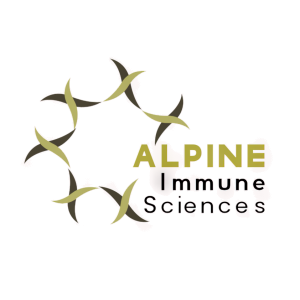Alpine Immune Sciences Announces Presentations at the 2022 EULAR and ASCO Annual Meetings
- ALPN-303 Novel Preclinical Data and Preliminary Phase 1 Data at
- Davoceticept (ALPN-202) Monotherapy Update and Trials in Progress Poster for Pembrolizumab Combination Study at ASCO -
| EULAR Annual Congress | ||
Novel preclinical and preliminary phase 1 healthy volunteer data of ALPN-303 will be presented as follows: |
||
Poster Title: |
ALPN-303, an Engineered Dual BAFF/APRIL Antagonist, Potently Inhibits Pathogenic Autoantibodies in Preclinical Models, with Corresponding Pharmacodynamic Activity in Humans |
|
Session Title: |
Pathogenesis of SLE, Sjögren’s and antiphospholipid sydrome |
|
Session Date, Time: |
|
|
Presentation Number: |
POS0094 |
|
Poster Display Details: |
Available virtually at the start of the annual congress starting at |
|
ASCO Annual Meeting |
||
Updated data from the dose escalation portion of NEON-1, a phase 1 study of davoceticept as monotherapy, and a trials in progress poster of NEON-2, a phase 1 combination study of davoceticept and pembrolizumab, will be presented at poster presentations as follows: |
||
| Poster Title: | Dose Escalation of Davoceticept, a Conditional CD28 Costimulator and Dual Checkpoint Inhibitor, in Advanced Malignancies (NEON-1) |
|
| Session Title: | Developmental Therapeutics—Immunotherapy |
|
| Session Date, Time: |
|
|
Poster Number: |
2560 |
|
|
||
|
||
| Poster Title: | Davoceticept (ALPN-202), a PD-L1-dependent CD28 costimulator and dual checkpoint inhibitor, in combination with pembrolizumab in patients with advanced malignancies (NEON-2) |
|
| Session Title: | Developmental Therapeutics—Immunotherapy |
|
Session Date, Time: |
|
|
Poster Number: |
TPS2683 |
|
A copy of each poster will be available on the
About ALPN-303
ALPN-303 is a dual B cell cytokine antagonist being developed for multiple autoimmune and/or inflammatory diseases. Engineered by directed evolution, ALPN-303 potently inhibits the pleiotropic B cell cytokines B cell activating factor (BAFF, BLyS) and a proliferation inducing ligand (APRIL), which play key roles in B cell development, differentiation, and survival, and together contribute to the pathogenesis of multiple autoimmune diseases like systemic lupus erythematosus (SLE) and many other autoantibody-related inflammatory diseases. By simultaneously blocking these two cytokines, ALPN-303 has the potential to improve outcomes in patients suffering from severe autoimmune and/or inflammatory diseases.
About Davoceticept (ALPN-202)
Davoceticept (ALPN-202) is a first-in-class, conditional CD28 costimulator and dual checkpoint inhibitor intended for the treatment of cancer. Preclinical studies of davoceticept have successfully demonstrated superior efficacy in tumor models compared to checkpoint inhibition alone. NEON-1 (NCT04186637), a Phase 1 monotherapy dose escalation and expansion trial in patients with advanced malignancies, has completed dose escalation and is currently enrolling its expansion cohorts. NEON-2 (NCT04920383), a combination study of davoceticept (ALPN-202) and pembrolizumab, was initiated in
About
Forward-Looking Statements
This release contains forward-looking statements within the meaning of Section 27A of the Securities Act of 1933, Section 21E of the Securities Exchange Act of 1934 and the Private Securities Litigation Reform Act of 1995. These forward-looking statements are not based on historical fact and include statements regarding our platform technology and potential therapies; the potential efficacy, safety profile, future development plans, addressable market, regulatory success, and commercial potential of our product candidates; and the timing of our public presentations and potential publication of future clinical data; . Forward-looking statements generally include statements that are predictive in nature and depend upon or refer to future events or conditions and include words such as “may,” “will,” “should,” “would,” “expect,” “plan,” “intend,” and other similar expressions, among others. These forward-looking statements are based on current assumptions that involve risks, uncertainties, and other factors that may cause actual results, events, or developments to be materially different from those expressed or implied by such forward-looking statements. These risks and uncertainties, many of which are beyond our control, include, but are not limited to: clinical trials may not demonstrate safety and efficacy of any of our product candidates; our ongoing discovery and preclinical efforts may not yield additional product candidates; our discovery-stage and preclinical programs may not advance into the clinic or result in approved products; any of our product candidates may fail in development, may not receive required regulatory approvals, or may be delayed to a point where they are not commercially viable; we may not achieve additional milestones in our proprietary or partnered programs; the impact of competition; adverse conditions in the general domestic and global economic markets; the impact of the COVID-19 pandemic on our business, research and clinical development plans and timelines and results of operations, including the impact on our clinical trial sites, collaborators, and contractors who act for or on our behalf, may be more severe and prolonged than currently anticipated; as well as the other risks identified in our filings with the
“NEON-1,” “NEON-2,” "Synergy," and the Alpine logo are registered trademarks or trademarks of
ALPN-202, NEON-2 study is being conducted in collaboration with
View source version on businesswire.com: https://www.businesswire.com/news/home/20220526005277/en/
Director, Investor Relations and Corporate Development
206-788-4545
ir@alpineimmunesciences.com
Media Relations
kelli@redhousecomms.com
Source:
Source:








